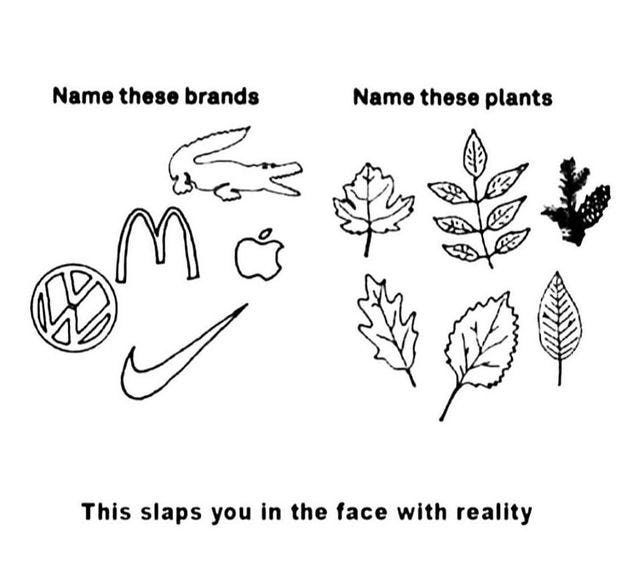Dear Wildlings,
The initial newsletter I was writing focused on the EU’s biofuel scam. However, last night as I finished Isabella Tree’s book Wilding, and turned the last page with mixed feelings of hope and angst, I decided to change topic.
Isabella’s memoire of her rewilding experience and the incredible return of biodiversity to the usually tidy English country, is a rollercoaster of emotions. Throughout the book you are constantly a little confused by the nomenclature of trees, scrub and birds and a little embarrassed by this lack of knowledge too.
A while back we posted this “meme” on Instagram. The hard truth stares back at you. Our connection with nature is dwindling, whilst our vacuous consumption keeps on rising. In the UK 80% of my generation has grown up in an urban environment, with exposures to nature segregated to a couple of weekends in the country. Known as the “indoor generation” we were seldom left alone to explore the outdoors unsupervised—and we never really questioned whether these “outdoors” were actually wild.
Yet, as mental health deteriorates at the same time as our skies, oceans and mountains empty, it seems that our very sadness is steeped in a desperate desire to rewild our souls too. Witnessing wildlife, experiencing nature and feeling humbled by it shows that humans’ purpose in life is actually simple: a life where humans and biodiversity thrive together, is a life full of meaning.
Of course this is a concept deeply entrenched in many indigenous societies already. Which is why I ultimately have a lot of hope for the future. In the west we have been losing our natural sensitivities slowly each century, and it seems that we have reached a crucial tipping point. It’s almost as though we had to first attain certain technological advancements and witness ecological catastrophes for people to realize that the answer to our woes is much much simpler. As Knepp demonstrates, we need to trust in the processes of nature—by doing so we not only nourish our souls, but can also increase food yields, alleviate biodiversity decline and fight the climate crisis.
“One of the penalties of an ecological education is that one lives alone in a world of wounds”—Aldo Leopold
This particular quote struck a chord. I often feel misunderstood when I say that the Mediterranean is the saddest ocean in the world: it’s basically dead. Or that when I gaze at the managed Swiss forests I can’t help but wonder what these mountains looked like when their earlier tenants of deer, foxes, wolves, lynxes and bears roamed them. We are not destined to a future of agriculture land and cows, we can actually bring wilderness back, and we desperately need to.
True wilderness has vanished in Europe. But Knepp is a corner of hope. As rewilding projects take precedence, I hope you see this as a beautiful opportunity to rewire our culture and catapult us into a better, wilder future.
Our collective imagination knows brand names by heart, but it has officially failed when an entire generation has never heard the song of a nightingale.
To learn more about rewilding listen to our podcast episode
A note on biofuels: what are they and why they are the scam of the century
Like bioplastics, biofuels are terrible for the environment. Essentially, most biofuel today is made from cutting down trees and turning them into pellets, then burning them for fuel. Of course burning trees releases a lot of GHG (greenhouse gases) and actually release more carbon than fossil fuels. So why, oh why has the European Union been subsidizing this inefficient energy source, and why is it classified as renewable?
Advocates for the energy source claim that the oxygen that live trees produce when alive offsets the carbon they release when burnt—crazy right? We need our vital oxygen producers now more than ever.
Unfortunately, European parliamentarians are worried that without this energy source the EU will never hit there 2030 Paris Agreement targets, and as the war in Ukraine intensifies EU politicians want to increase this energy source by the end of the year to stop its reliance on Russian gas.
There is now an ongoing petition to the European Parliament to de-classify biofuels as a form of “renewable” energy. Please sign it!





